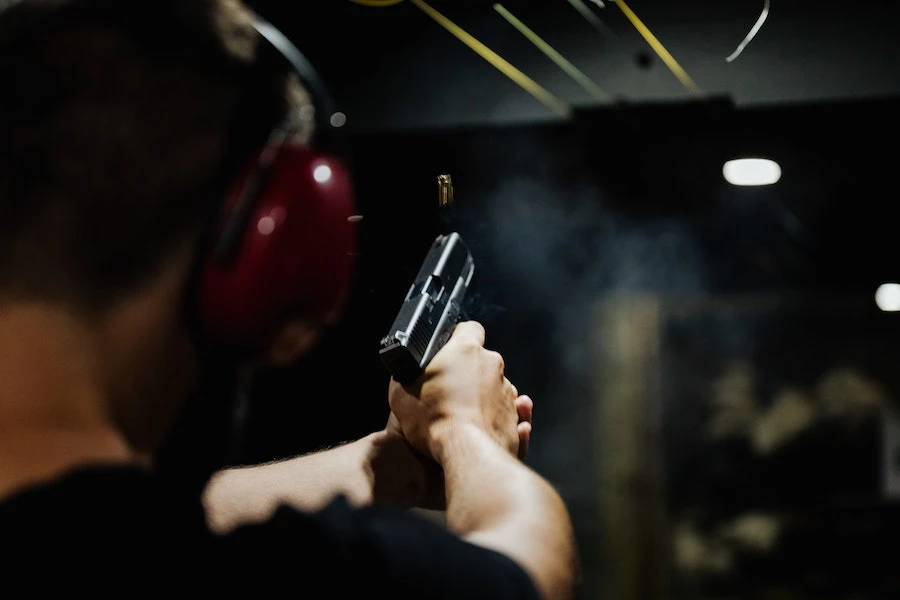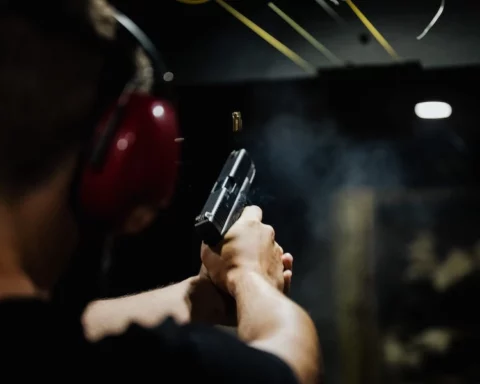Search
About Us
Follow
Signup to Newsletter
Get our regular posts notification, just subscribe our newsletter and keep reading.

Can A Felon Go To A Gun Range? A Look at Gun Range Restrictions

Can a felon go to a gun range? This question has been debated in the United States for many years. On the one hand, the Second Amendment of the U.S. Constitution guarantees the right to bear arms.
But on the other hand, individuals convicted of a felony face restrictions on their ability to own or possess firearms.
With approximately 20 million convicted felonies in the USA, this raises important legal and practical considerations that must be carefully examined.
And that is what this article is going to be all about. To help you try and understand shooting law range and restrictions for convicted felons. We’ll start by answering the question,
Can a felon go to a gun range?
No, under federal law, it is illegal for anyone convicted of a felony to possess or use a firearm.
In 1968, the federal government passed the Gun Control Act to prevent any violent or non-violent convicted felon from exercising their gun rights.
If caught in possession or transportation of a gun, a person with a felony conviction may be charged with a class 6 felony, which could lead to a ten-year imprisonment.
Federal Firearm Prohibitions
Under the federal law of the United States, certain people are not allowed to possess firearms or ammunition. These include;
- Persons who are not citizens of the United States.
- Individuals who have renounced their U.S. citizenship.
- Convicted felony.
- Individuals who have been dishonorably discharged from the Armed Forces.
- People who have been diagnosed with a mental illness.
- Individuals who have been convicted of a domestic violence misdemeanor.
- Addicts or unlawful users of controlled substances.
- Fugitives from justice.
- Individuals subject to a court order that restrains them from stalking, harassing, or threatening a child or an intimate partner.
Restoring Your Gun Rights To Shoot At A Shooting Range
While it is true that federal law prohibits felonies from owning or possessing firearms, there are some potential avenues for regaining these rights.
The extent of restrictions on an individual’s gun rights depends on the nature and severity of their felony conviction.
Thus, depending on the case’s particulars, it might be possible to regain the privilege of owning a firearm and visiting a gun range. However, you must meet the following two conditions;
- You must not have been convicted of a forcible felony within the past 20 years.
- A minimum of 20 years must have passed since the completion of your jail time.
- You should not have been convicted of a felony involving a dangerous weapon.
After you have confirmed that you are eligible to restore your gun rights, here are the three ways you can do so.
A “wobbler” felony can be reduced to a misdemeanor – A “wobbler” offense in criminal law can be classified as either a felony or misdemeanor, depending on the discretion of the prosecuting authority.
If an individual is convicted of a wobbler offense as a felony, they can petition the court to reduce the charge to a misdemeanor.
Once the felony charge is reduced to a misdemeanor, the individual will only have to abide by the restrictions associated with the crime at the misdemeanor level.
Presidential pardon – Restoring gun rights for individuals who have been convicted of a federal felony is honestly a challenging task.
Federal court is not an option for felons seeking to restore their gun rights, and a presidential pardon may be the only way to fully restore federal firearm rights.
Although obtaining a pardon may seem challenging, it is not impossible. With a strong case and capable legal representation, some individuals may successfully obtain a pardon and fully restore their gun rights.
Pardon from the Governor – Depending on your state, a Governor may have the power to restore firearm rights for those convicted of non-serious offenses.
However, it’s crucial to keep in mind that there are specific constraints to this procedure. One of the primary limitations is that Governors cannot restore firearm rights for those convicted of out-of-state or federal offenses.
Furthermore, even if the Governor has the authority to restore gun rights, the process can be complicated and involve various legal obstacles, which may necessitate the assistance of a skilled attorney.
Presidential pardon – Restoring gun rights for individuals who have been convicted of a federal felony is honestly a challenging task.
Federal court is not an option for felons seeking to restore their gun rights, and a presidential pardon may be the only way to fully restore federal firearm rights.
However, with a strong case and capable legal team, you can successfully pardon and fully restore your gun rights.
Background Checks At Shooting Range
Shooting ranges can be a fun place to improve your shooting accuracy or enjoy a leisurely shooting activity.
However, in light of the current gun violence situation in the country, they have come under closer scrutiny.
This is because of their role in providing firearms access to individuals who may not be authorized to possess them.
As a result, many shooting ranges have taken the initiative to conduct background checks for all customers to ensure that only those legally permitted to own firearms can use them at their facility.
The information collected in the background check may include the individual’s criminal history, driving records, credit report, and academic records.
Although a background check can reveal all this information, most shooting ranges prioritize the criminal records of their patrons as it helps them assess any security or safety risks.
The Importance of Legal Guidance And Representation When Seeking To Regain Gun Rights After A Felony Conviction
The laws regarding the restoration of gun rights after a felony conviction varies by state, making the process both time-consuming and difficult.
A skilled attorney familiar with your state’s process can guide you through the steps and advocate for your rights.
They can also assist in gathering evidence, presenting a solid case, and informing you about any potential consequences or limitations.
Individuals may face unnecessary delays, complications, and even further legal consequences without proper legal representation.
It is, therefore, important to have a knowledgeable attorney by your side to protect your rights and navigate the process as smoothly as possible.
Safety Protocols At Gun Ranges
If you are planning to visit a gun range, it is important to understand the safety procedures and equipment guidelines, including the use of firearms.
Whether you are an experienced shooter or a novice, prioritizing safety and getting acquainted with the gun range’s protocols is imperative before engaging in shooting activities. Here are some common safety protocols at gun ranges.
- Always keep firearms pointed in a safe direction
- Always keep your finger off the trigger until you are ready to shoot
- Keep firearms unloaded and safe when entering or exiting the range to prevent potential accidents.
- Always stop shooting when someone calls for a “Cease Firing” to ensure everyone’s safety.
- Ensure all firearms are unloaded and placed on the bench before going down when the range is “COLD.”
- Shooters are allowed to commence firing when the range is declared “HOT.” Only shooters are permitted on the firing line, and guns should only be moved when the range is “HOT.”
An Overview of the Gun Control Act
The Gun Control Act of 1968 is a federal law in the United States that governs the firearms industry and owners.
The law was introduced in response to the tragic assassinations of President John F. Kennedy, Senator Robert F. Kennedy, and civil rights leader Martin Luther King Jr.
Under the GCA, firearms dealers must obtain a federal firearm license and conduct background checks on individuals wishing to buy firearms.
In addition, the Act prohibits specific categories of people, such as convicted felons, fugitives from justice, and individuals who have been deemed mentally incompetent, from owning firearms.
The Act also regulates the type of firearms that can be sold and how they can be sold. It prohibits the sale of machine guns to civilians without federal permission and requires firearms manufacturers and importers to mark their products with a traceable serial number.
The GCA has been amended many times since it was first enacted, with the most notable amendment being the Brady Handgun Violence Prevention Act of 1993.
It established the National Instant Criminal Background Check System (NICS) for firearm purchases.
While the GCA has been controversial and debated, it remains one of the most significant federal laws regulating firearms in the United States.
Conclusion
The question of whether a felon can go to a gun range or not has now been fully answered and discussed.
As you already know, individuals with felony charges are prohibited by federal law from owning or possessing firearms. However, there are certain options available that may allow them to regain these rights.
Obtaining legal advice and representation could play a vital role in guiding you through the procedure and possibly restoring your firearm privileges after a felony conviction.
Share Article
Susan Tapia is an ambitious, savvy news writer with a vibrant personality and an eye for detail. She is highly experienced in crafting compelling stories and dedicated to seeking out the truth. With her inquisitive nature, she delves deep into every subject she touches, uncovering unexpected facts that help her engage her readers. Susan has an unbridled passion for writing, and she strives to inspire others through her work. She confidently shares her thought-provoking ideas with enthusiasm and candor, making sure the world can see the truth no matter how uncomfortable it may be. Simply put, Susan Tapia is a trailblazer in the journalism industry who never fails to deliver her readers riveting stories they won't soon forget.

























